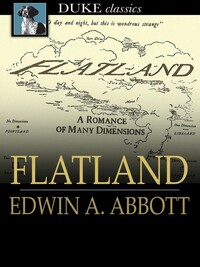Take a photo of a barcode or cover
Fascinating on more than one level, "Flatland" will be of interest to a wide range of readers. Mathematicians, physicists, and science nerds in general are likely to appreciate a work of fiction which is not merely about their field of study, but actually of their field of study. Science fiction fans will appreciate its unique premise and its historical significance as a pioneering work in the genre. Students of the Victorian era will enjoy the author's often over-the-top commentary on the social mores of the day. And any reader who craves substance along with their entertainment will walk away satisfied. Caveats: The humor here is, at times, pretty dark, and those without a sense of humor may interpret it as misogynistic, authoritarian, bigoted, etc.
It's an interesting thought exercise, and given that it was written over a hundred years ago likely inspired a lot of science fiction.
challenging
mysterious
reflective
slow-paced
Strong character development:
No
Diverse cast of characters:
N/A
Flaws of characters a main focus:
Complicated
Graphic: Ableism, Child death, Misogyny, Sexism, Medical trauma, Classism
Minor: Confinement, Forced institutionalization
I loved it and thought it was a bit difficult to me, but I always felt really annoyed by how the author and everyone on the book treated women. I know this book is 130 years old, but that was a thing that I always felt creeping behind every word in the book and that made me kinda mad sometimes. But besides that, it was really awesome, entretaining, interesting and informative.
A creative, funny, mathematical short story that explores a world called Flatland, where everything is two-dimensional. Every being in this world is a two-dimensional shape, with the classism (from the late nineteenth century) shown creatively in the form of irregularity of the polygons/ sharp pointy edges/ and more. The story is told by a square who, in the first of two parts, explains how his world functions and how it may be difficult for us from "Spaceland" to conceive. He takes us through the evolution of generations, how they live, the rules of the Flatland, and many interesting counterparts of our spaceland. In the second part, he recounts his experience visiting Pointland, Lineland, and Spaceland. It ends with him being banished/imprisoned for trying to convince the flatlanders of the existence of higher dimensions (quite fitting to how the world responded to people with "insane" ideas in those times).
A very good book. A simple tale bu quite eye opening tale on perspective, in all senses of the word. A period satire is probably the best explanation of this book, but it has science fiction stylings as well. I'd seen it referenced in two books I read last year and so picked it up. Well worth a read.
A square living in a two-dimensional plane explains his ingenious world, and his revelatory introduction to lands of fewer--and more--dimensions. I have fond memories of reading this book as a child, but this was my first time revisiting it since then--and it was quite an experience. What I remembered best is a brillaint, unique concept, and that's still there: there's nothing else out there like Flatland, a world that appears utterly alien but is in fact too well-realized to be unfamiliar. It's ingenious, and a delight to rediscover. Yet this slim volume offers more than that idea alone. About half the book is given over to infuriating social satire, which I'd forgotten about completely. The satire isn't always obvious as such: Flatland's society has an extreme view of the misogyny, classicism, and essentialism present in our own (and particularly in Abbott's Victorian era), but the sad truth is that it's not a grand exaggeration--and it's presented so blandly that it reads more like an unfortunate relic of prejudice than any sort of social commentary. As such, I worry that the satire may go over the heads of younger readers (I can't remember if it went over mine) and would be taken at face value; regardless, it feels almost out of place--not that it doesn't have moments of keen, even painful, insight, but it is quite disparate from the fascinating physics lesson that fills the rest of the book.
To wit, the other half of the book is a novel exploration of dimension, verifying and exploring the existence of four or more dimensions by exploring two and fewer. It may not render comprehensible the incomprehensible, but it's a strong argument for some sort of world greater than the one we know. Meanwhile, the dimensions explored by our narrator the square are fascinating. Abbott succeeds by taking his concept to its furthest extent: the lines and shapes have unusual societies which are greatly influenced by the nature and limitations of their worlds, surprisingly simple diagrams help the reader to enter these unusual lands himself, and Abbott often anticipates--and then answers--the questions and doubts that surround his strange ideas. He takes what seems to be a pure mathematical novelty and renders it from a dynamic, convincing first-person perspective--and while it remains just one imaginative interpretation of the issue at hand, it's a brilliant one and a great read. Abbott's voice can tend towards stilted and dated, but Flatland's combination of breadth and brevity nonetheless make it compelling. This may not be precisely the book that I remember, but it provides what I loved and remembered best: something ingenious and brilliantly realized, something intriguing and delightful and thought-provoking. I take more issue with Flatland now than I did then, but I find it fascinating above all and so recommend it despite lingering reservations.
To wit, the other half of the book is a novel exploration of dimension, verifying and exploring the existence of four or more dimensions by exploring two and fewer. It may not render comprehensible the incomprehensible, but it's a strong argument for some sort of world greater than the one we know. Meanwhile, the dimensions explored by our narrator the square are fascinating. Abbott succeeds by taking his concept to its furthest extent: the lines and shapes have unusual societies which are greatly influenced by the nature and limitations of their worlds, surprisingly simple diagrams help the reader to enter these unusual lands himself, and Abbott often anticipates--and then answers--the questions and doubts that surround his strange ideas. He takes what seems to be a pure mathematical novelty and renders it from a dynamic, convincing first-person perspective--and while it remains just one imaginative interpretation of the issue at hand, it's a brilliant one and a great read. Abbott's voice can tend towards stilted and dated, but Flatland's combination of breadth and brevity nonetheless make it compelling. This may not be precisely the book that I remember, but it provides what I loved and remembered best: something ingenious and brilliantly realized, something intriguing and delightful and thought-provoking. I take more issue with Flatland now than I did then, but I find it fascinating above all and so recommend it despite lingering reservations.
I never thought that math and science fiction could go so well together. This satirical essay is an enjoyable little read and really deserves more like 3.5 stars. It follows the adventures of Mr. Square as his two dimensional world is opened up to infinite possibilities. the first half is an excellent, if a bit long, description of what a two dimensional world would be like. Then it goes into 1, 3, 0, and even contemplates 4+ dimensions. A nice short enjoyable read.
medium-paced
Plot or Character Driven:
Character
Strong character development:
Yes
i’m not very good at math so perhaps a whole dimension (lol) has been lost on me. but y’a know, it’s fundamentally a cosmic horror story told through a mathematic thought experiment on dimensions




